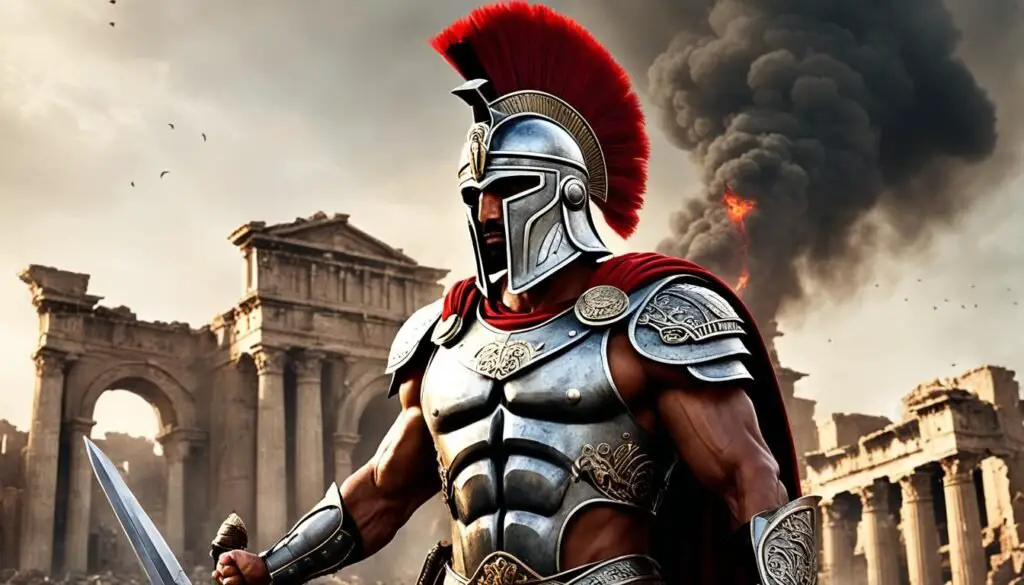Hector, a Trojan prince and the greatest warrior for Troy during the Trojan War, is a major character in Homer’s Iliad. He led the Trojans and their allies in the defense of Troy, killing countless Greek warriors. Hector was ultimately killed in single combat by Achilles, who dragged his dead body around the city of Troy.
Key Takeaways:
- Hector was a Trojan prince and the greatest warrior for Troy during the Trojan War.
- He played a pivotal role in the defense of Troy, leading the Trojans and their allies.
- Hector’s tragic death in single combat against Achilles marked a turning point in the war.
- His story showcases themes of honor, courage, and the consequences of pride.
- Hector’s legacy as a heroic figure in Greek mythology continues to inspire and captivate audiences today.
Hector’s Role in the Trojan War
Hector, as the leader of the Trojan army, played a pivotal role in the Trojan War. He demonstrated his unwavering dedication to defending Troy against the invading Greek forces. With his strategic prowess and exceptional leadership skills, Hector was instrumental in the Trojan’s successes during the war. His fearless and heroic deeds on the battlefield earned him a reputation as a formidable opponent for the Greeks.
Throughout the conflict, Hector led his troops with determination and courage. He commanded and coordinated the Trojan army, devising strategies to counter the Greek assaults. Hector’s astute decision-making and exceptional combat skills had a significant impact on the outcome of several battles. His leadership inspired his fellow Trojans to fight with determination and unwavering loyalty, fueling their resistance against the Greek invaders.
Despite the relentless pressure from the Greeks, Hector’s unwavering commitment to the defense of Troy never waned. His resilience and unwavering dedication to his city and people made him a beloved figure among the Trojan ranks. Hector’s presence on the battlefield instilled confidence in his troops and struck fear into the hearts of his enemies.
Hector’s Heroic Deeds
Hector’s heroism was best exemplified by his numerous feats of valor during the Trojan War. He displayed exceptional bravery and skill in combat, defeating many renowned Greek warriors. Whether leading his troops in battle or engaging in one-on-one duels, Hector always exhibited immense courage and unwavering determination. His unwavering commitment to defend Troy until his last breath became a symbol of honor and heroism.
One notable example of Hector’s heroism was his duel with the Greek champion Ajax. Despite being evenly matched, Hector fought valiantly and displayed incredible strength and skill. Though the duel ended inconclusively, Hector’s display of bravery further solidified his reputation as a fierce warrior.
Hector’s role in the Trojan War was a crucial aspect of the conflict. His leadership, valor, and unwavering dedication to the defense of Troy made him a legendary figure in Greek mythology. The Trojan War may have ultimately led to the downfall of Troy, but Hector’s legacy as a heroic warrior lives on.
Hector’s Family and Background
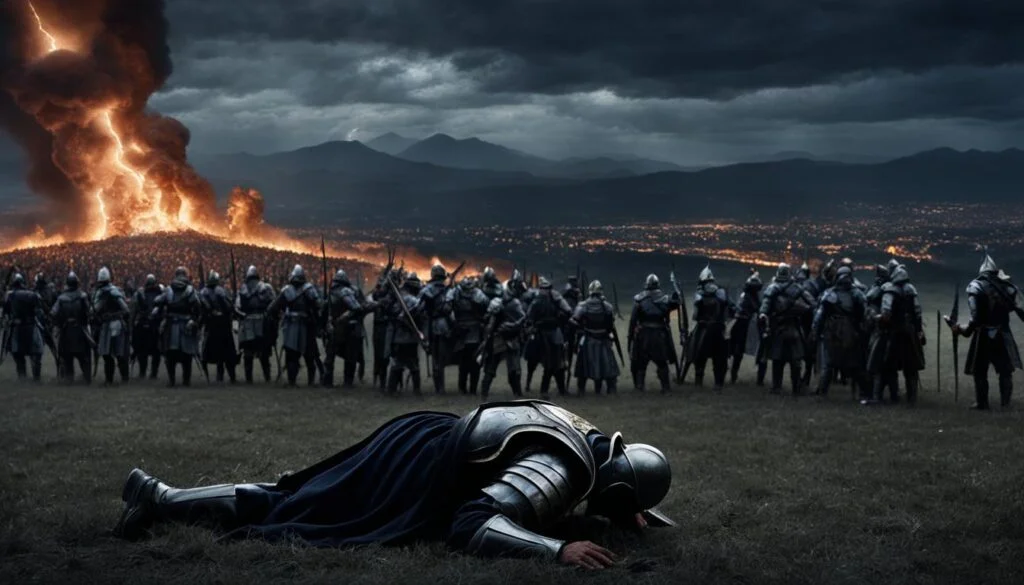
Hector, renowned as the greatest warrior for Troy during the Trojan War, was the eldest son of King Priam and Queen Hecuba of Troy. Born into a noble lineage, Hector had strong ties to his family, which added to his heroic status in Greek mythology.
His siblings included Paris, Cassandra, Helenus, Polyxena, and Troilus, each playing their own role in the epic tales surrounding the fall of Troy. Hector’s marriage to Andromache, a princess of Cilicia, further solidified his family connections.
Together, Hector and Andromache had a son named Astyanax, who, tragically, became a target in the ongoing conflict between Troy and the Greeks.
Hector’s fate in Greek mythology intertwines with the legendary duel between him and the Greek hero Achilles. This intense battle, showcasing the clash between two formidable warriors, has become a defining moment in the epic narrative.
In the next section, we will dive into the description and characteristics that shaped Hector’s legacy as a heroic figure in Greek mythology.
Hector’s Description and Characteristics
Hector, the renowned Trojan warrior, possessed several distinct physical features that contributed to his striking appearance. He stood tall and had a stout build, exuding strength and power on the battlefield. With his curly hair and a well-defined nose, Hector possessed a noble countenance that reflected his regal lineage. These physical attributes emphasized his commanding presence and made him easily distinguishable among his fellow warriors.
However, Hector’s true strength lay in his character and virtues. Despite his reputation as a fearless warrior, Hector was more than just a skilled combatant. He was a peace-loving individual who valued diplomacy and sought peaceful resolutions whenever possible. Hector’s thoughtfulness and empathy set him apart from his peers on the battlefield.
As a devoted son, husband, and father, Hector’s qualities transcended the violence of war. He cherished his family and held deep respect for the bonds of kinship. This aspect of his character made him relatable and earned him the admiration of both his allies and foes.
While Hector’s physical prowess and military expertise were undeniable, it was his moral compass, compassion, and commitment to his loved ones that truly defined him as a legendary figure in Greek mythology.
Hector’s Actions and Deeds
Throughout the Trojan War, Hector displayed his bravery and fighting abilities. He led successful assaults on the Greek forces, killing many renowned Greek heroes. Hector’s actions were praised by the Trojans, but his feats also drew the ire and fear of the Greeks, particularly Achilles.
Hector’s heroic deeds on the battlefield became legendary. With his exceptional skill and unwavering courage, he struck fear into the hearts of the enemy. Leading his troops, he fought fiercely, defending his beloved city of Troy with unwavering resolve.
Hector’s strategic brilliance and tactical prowess were evident in his successful assaults on the Greeks. He defeated warriors who were considered the best in their ranks, overcoming their defense and striking them down in single combat.
Hector’s feats of valor resonated throughout the Trojan War, inspiring his fellow Trojans to fight with renewed determination. His leadership on the battlefield was crucial in boosting the morale of his troops, as they looked up to him as a symbol of courage and heroism.
The Trojans hailed Hector as a hero, singing songs of his glory and praising his noble character. His actions and deeds during the war elevated him to a legendary status, making him a revered figure in Greek mythology.
Hector’s Duel with Achilles
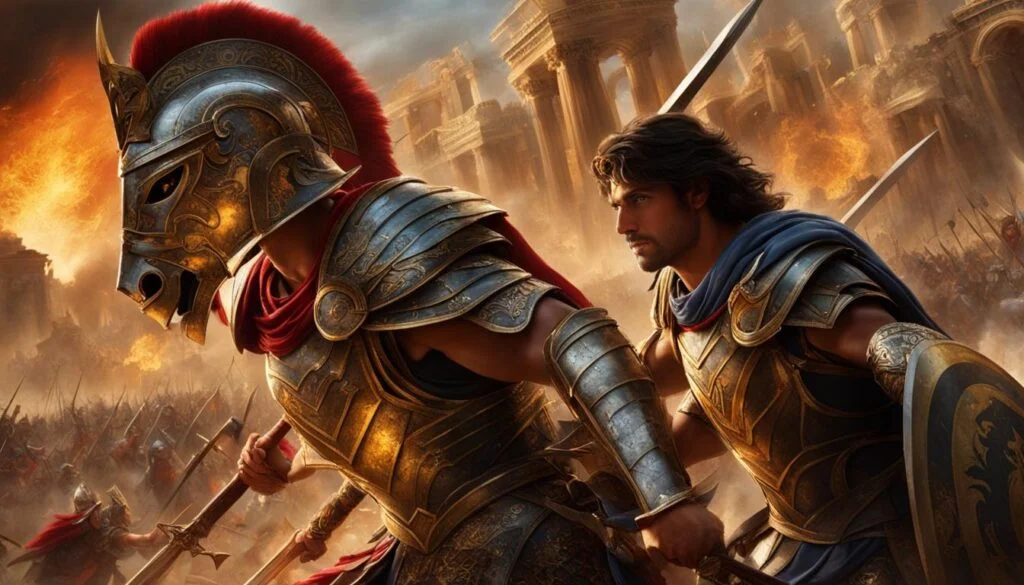
Hector’s fate was sealed when he engaged in a one-on-one **duel with Achilles**. In their epic battle, Hector put up a valiant fight but was ultimately overpowered by Achilles. Hector’s death marked a turning point in the war and led to the downfall of Troy.
Despite his courage and skill, Hector’s encounter with Achilles proved to be his undoing. Achilles, known for his legendary strength and invincibility, proved to be a formidable adversary. The clash between these two legendary warriors showcased their incredible prowess and the intensity of their rivalry.
The duel between Hector and Achilles was a pivotal moment in the Trojan War. As the greatest warrior on the Trojan side, Hector’s defeat at the hands of Achilles had significant consequences. It further bolstered the confidence and morale of the Greek forces, while also demoralizing the Trojans.
Moreover, Hector’s death at the hands of Achilles directly led to the eventual fall of Troy. Without Hector’s leadership and military expertise, the Trojans struggled to defend their city against the relentless assault of the Greeks. The duel between Hector and Achilles forever altered the course of the war and cemented Achilles’ status as a legendary hero.
Hector’s Body and Funeral
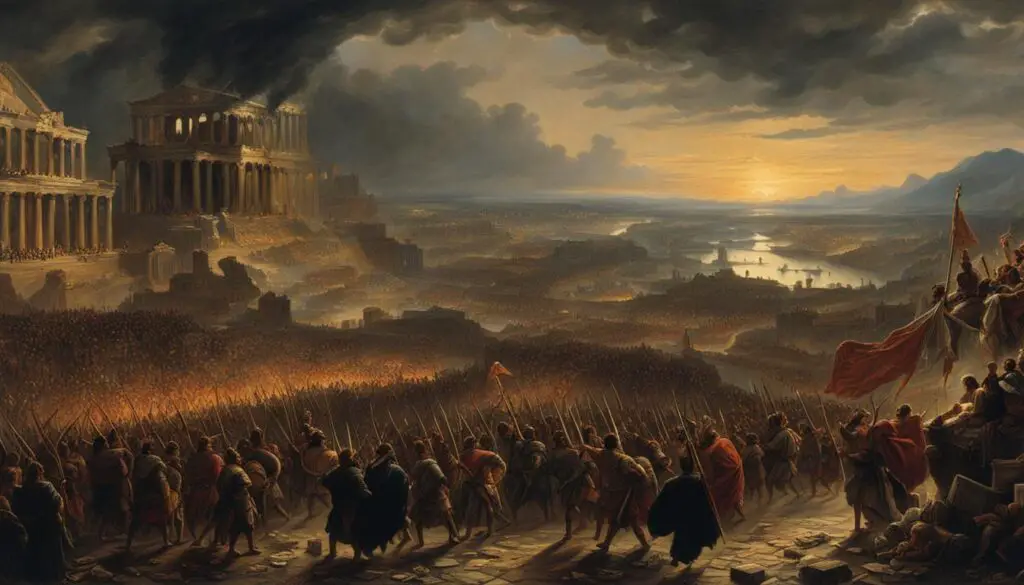
After killing Hector, Achilles defiled his body by dragging it behind his chariot. This act of disrespect angered the gods and ultimately led to Achilles’ own downfall. Eventually, Hector’s father, King Priam, went to Achilles to ransom his son’s body, and Hector was given a proper burial.
The fate of Hector’s body played a significant role in Greek mythology. Achilles’ desecration of Hector’s corpse outraged the gods, who aided the Trojans in obtaining Hector’s remains for a dignified funeral. This event showcases the consequences of disrespecting fallen warriors and the role of divine intervention in shaping the course of the Trojan War.
Hector’s Legacy
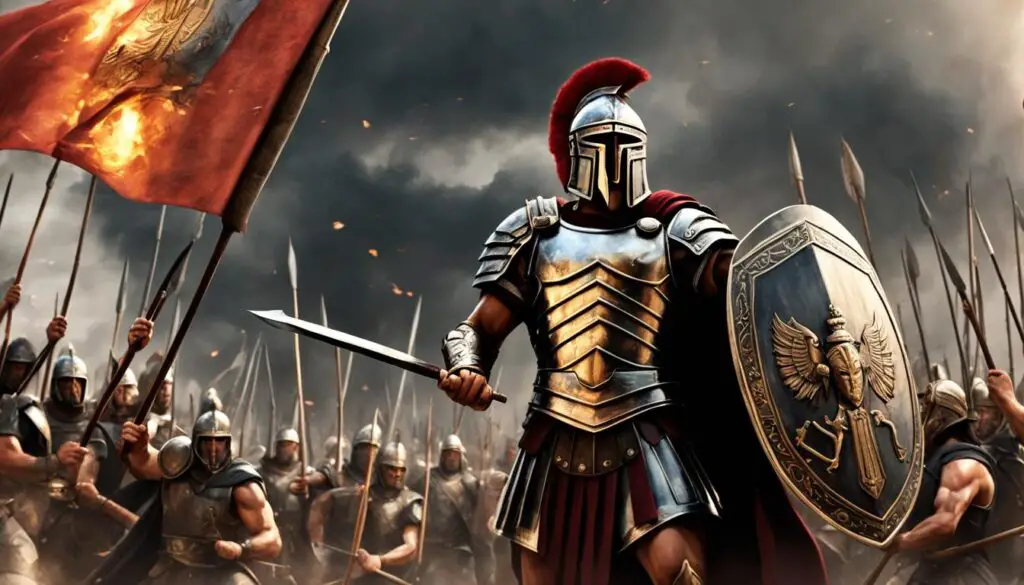
Hector, the renowned Trojan warrior in Greek mythology, left behind a lasting legacy as the hero of Troy. His bravery and honor made him a symbol of inspiration for the Trojans and a revered figure in Greek culture. Even after his death, stories of his courageous deeds and tragic fate continued to be passed down through generations, immortalizing him in Greek mythology.
The Trojans held Hector in high regard, viewing him as the embodiment of bravery and valor. His unwavering courage in the face of overwhelming odds inspired his fellow Trojans to fight fiercely for their city. Hector’s legacy served as a reminder of the indomitable spirit and resilience of the Trojan people.
Throughout the centuries, the tales of Hector’s heroism and noble character have captivated audiences. His story has been retold in numerous works of literature, poetry, and art, further cementing his place in Greek mythology. From ancient epics like Homer’s Iliad to modern adaptations, Hector’s legacy continues to resonate with audiences around the world.
Hector in Mythology
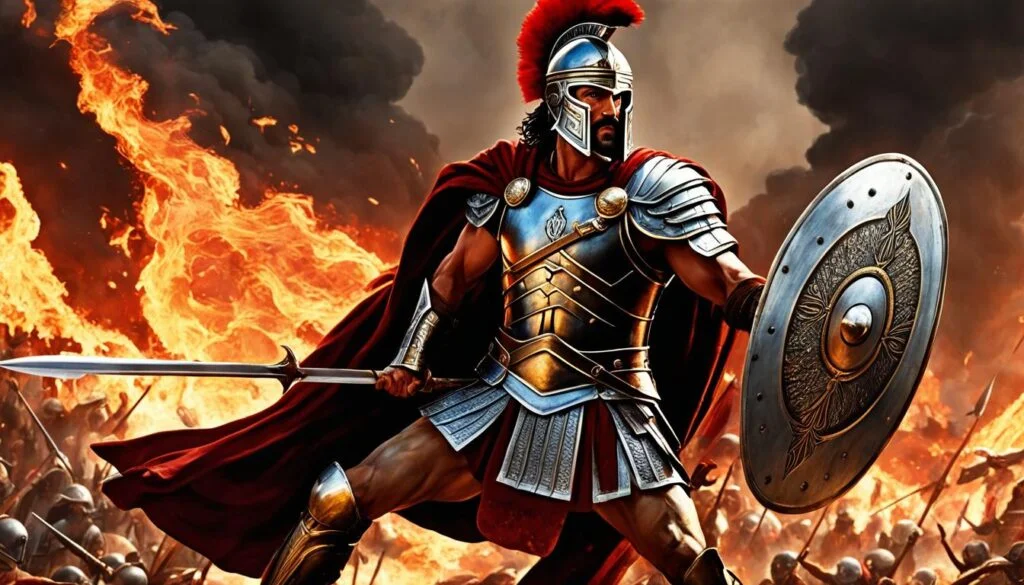
Hector, the Trojan prince and central figure in the Trojan War, occupies a prominent place in Greek mythology. His story is intricately intertwined with the epic struggle between the Trojans and the Greeks, representing the clash of civilizations and the quest for power and glory.
As a key figure in Greek mythology, Hector embodies the strength, valor, and tragic fate of the Trojan heroes. His noble actions and sacrifices epitomize the themes of honor, bravery, and selflessness. Hector’s character serves as a reminder of the consequences of pride and hubris, serving as a cautionary tale for mortals.
Challenged by Achilles, the Greek warrior, Hector stands tall as the Trojan prince who defended his city with unwavering determination. He fought fiercely, displaying remarkable skill and strategy, inspiring his fellow Trojans to fight with unmatched zeal.
Hector’s tragic fate, marked by his ultimate defeat at the hands of Achilles, encapsulates the cyclical nature of life, wherein even the mightiest warriors meet their downfall. The tale of Hector resonates with audiences as it explores the complexities of human nature, the fragility of life, and the relentless pursuit of glory.
In the realm of Greek mythology, Hector’s valiant efforts and resolute defense of Troy against formidable odds immortalize him as a legendary hero, forever etched in the annals of ancient history and revered by generations to come.
In the image above, we see an artist’s depiction of Hector of Troy, capturing his stoic bravery and unwavering resolve. This visual representation brings to life the legendary Trojan prince, offering a glimpse into the world of ancient mythology and the heroism of Hector.
Hector in Modern Culture
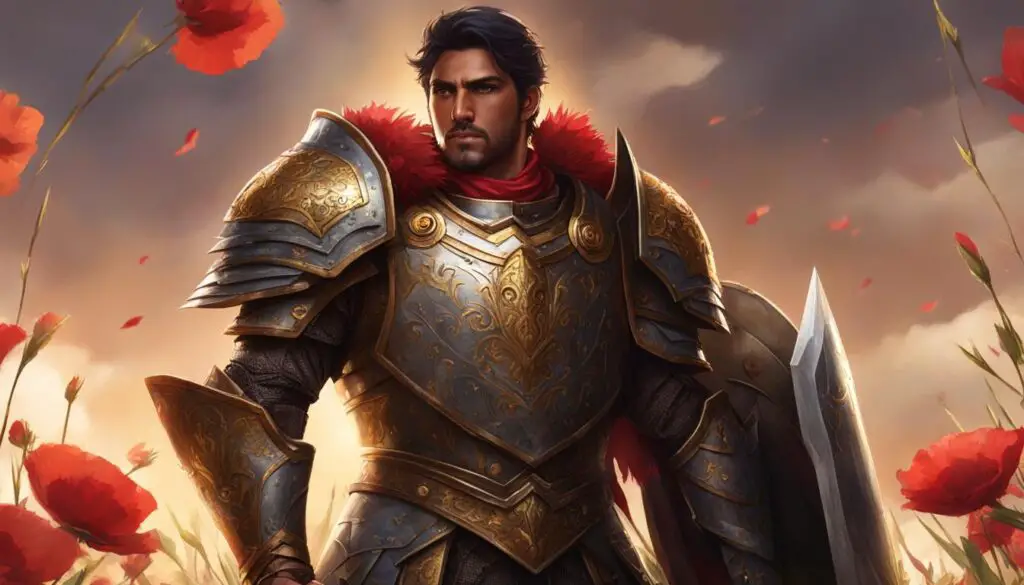
Hector’s character and story have inspired numerous works of literature, art, and entertainment. His portrayal as a noble and courageous hero has captivated audiences for centuries. Hector’s role in Greek mythology continues to be studied and appreciated in modern culture.
- Literature: Hector’s character has been featured in various literary works, both retellings of the Trojan War and original stories. Authors such as Virgil, Dante Alighieri, and Jean Racine have portrayed Hector’s bravery and tragic fate in their writings.
- Art: Artists throughout history have depicted Hector in various mediums, showcasing his heroic image. Paintings, sculptures, and illustrations have captured his noble appearance and struggle on the battlefield.
- Performing Arts: Hector’s story has been adapted into plays, operas, and even ballets. These performances often highlight the emotional depth of his character and the conflict between honor and fate.
- Popular Culture: Hector’s influence extends to popular culture, appearing in films, television shows, video games, and even comics. These adaptations often reimagine his character, showcasing different aspects of his personality and exploring new narratives.
Did you know? The character of Hector is often analyzed by scholars and critics, delving into his motivations, virtues, and significance within Greek mythology. His complexity as a character makes him a subject of character analysis, providing valuable insights into heroic archetypes and human nature.
Conclusion
Hector, the valiant Trojan warrior, met a tragic fate at the hands of the formidable Achilles in Greek mythology. His death not only marked the downfall of Troy but also represented the victory of the Greeks in the epic Trojan War. Hector’s unwavering valor and unwavering honor in the face of certain doom have immortalized him as an enduring figure in Greek mythology.
As the greatest warrior for Troy, Hector’s fate served as a focal point in Greek mythology. His decisive duel with Achilles showcased the clash between two mighty heroes and the triumph of Achilles over his Trojan counterpart. Hector’s bravery and noble spirit continue to captivate audiences, resonating through the annals of history.
While Hector’s tale ended in tragedy, his legacy lives on. His story serves as a cautionary tale, highlighting the consequences of hubris and the destructive power of war. The tragic fate of Hector remains a powerful reminder of the fragility of human existence and the ephemeral nature of glory.
FAQ
Who was Hector in Greek mythology?
Hector was a Trojan prince and the greatest warrior for Troy during the Trojan War. He played a pivotal role in defending Troy against the invading Greek forces.
What was Hector’s role in the Trojan War?
Hector led the Trojan army and defended Troy against the Greeks. His heroic deeds and leadership skills made him a formidable opponent for the Greeks.
What was Hector’s family background?
Hector was the eldest son of King Priam and Queen Hecuba of Troy. He had siblings such as Paris, Cassandra, Helenus, Polyxena, and Troilus.
How would you describe Hector’s characteristics?
Hector was tall, stoutly built, with a good nose, curly hair, and a noble appearance. He was known for his courage, strength, and skill in battle.
What were some of Hector’s heroic deeds?
Hector led successful assaults on the Greek forces during the Trojan War, killing many renowned Greek heroes and drawing the ire and fear of the Greeks, particularly Achilles.
What happened in Hector’s duel with Achilles?
Hector engaged in a one-on-one duel with Achilles. Although he put up a valiant fight, Hector was ultimately overpowered by Achilles, leading to his death.
What happened to Hector’s body after his death?
After killing Hector, Achilles defiled his body by dragging it behind his chariot. However, Hector’s father, King Priam, eventually ransomed his son’s body and gave him a proper burial.
What is Hector’s legacy in Greek mythology?
Hector is revered by the Trojans as a symbol of bravery and honor. His story and tragic fate have been passed down through generations, immortalizing him in Greek mythology.
How does Hector appear in modern culture?
Hector’s character and story have inspired numerous works of literature, art, and entertainment. His portrayal as a noble and courageous hero continues to captivate audiences.
What is the significance of Hector in Greek mythology?
As a key figure in the Trojan War, Hector embodies themes of honor, sacrifice, and the consequences of pride and hubris. His fate symbolizes the downfall of Troy and the victory of the Greeks.


